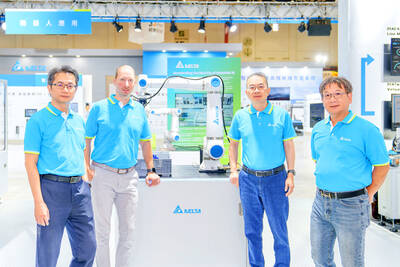Semiconductor Manufacturing International Corp (SMIC,
Under the settlement terms, SMIC will pay TSMC US$30 million in each of the next five years and US$25 million in the sixth and final year of the settlement.
The two parties also agreed to cross-license each other's patent portfolio through to 2010, TSMC said in a statement.
"With this settlement, we have amicably resolved all of our pending litigation with SMIC," said TSMC deputy chief executive Tseng Fan-cheng (
TSMC said it has agreed to dismiss all pending legal actions between the two companies in the courts here and in the US and at the US International Trade Commission.
Officials from both companies declined to give details on the patents involved.
"The settlement charge is clearly lower than our earlier estimate of US$730 million," said Andrew Lu (
SMIC yesterday reported sales in the three months ended Dec. 31 doubled to US$292 million from a year ago, surpassing revenue at Singapore's Chartered Semiconductor Manufacturing Ltd (
"While the global semiconductor industry has softened, the greater China region continues to demonstrate strength, accounting for 10 percent of total revenue," SMIC chief executive Officer Richard Chang (張汝京) said in yesterday's statement.
Fourth-quarter factory use was 95 percent, in line with its earlier forecast. Sales for this year will continue to grow, the company said.
``The settlement is good from TSMC's standpoint in that the legal process has worked," said Dan Heyler, an analyst with Merrill Lynch & Co in Hong Kong.
TSMC chairman Morris Chang (張忠謀) said "the payment is acceptable despite not being satisfactory."
Press reports had put the expected payment in a range of US$300 to US$600 million, suggesting TSMC might have arrived at the settlement under pressure from the Chinese authorities. But Chang flatly denied these reports.
TSMC said on March 24 last year that a witness estimated 90 percent of SMIC's technology for making chips with 0.18 micron spaces between transistors was copied from TSMC. The Taiwanese chipmaker produces its most advanced chips with 0.09 micron technology.
SMIC, founded by Richard Chang, a Taiwanese executive who spent 20 years at US chipmaker Texas Instruments, has lured away customers of TSMC and United Microelectronics Corp (UMC,
TSMC and units TSMC North America and WaferTech filed a complaint in a US district court in December 2003 against SMIC and unit SMIC Americas, alleging that SMIC improperly obtained TSMC trade secrets and infringed TSMC patents.
The complaint stated that SMIC hired away more than 100 TSMC employees and asked some of them to disclose the TSMC trade secrets.
The suit also alleged that one SMIC official asked a then-TSMC manager to obtain TSMC process technology information for SMIC.
Last March, TSMC filed new evidence of alleged corporate espionage by SMIC with a US Federal Court, claiming that SMIC stole advanced semiconductor manufacturing technologies and other trade secrets from TSMC and its US affiliates.

SETBACK: Apple’s India iPhone push has been disrupted after Foxconn recalled hundreds of Chinese engineers, amid Beijing’s attempts to curb tech transfers Apple Inc assembly partner Hon Hai Precision Industry Co (鴻海精密), also known internationally as Foxconn Technology Group (富士康科技集團), has recalled about 300 Chinese engineers from a factory in India, the latest setback for the iPhone maker’s push to rapidly expand in the country. The extraction of Chinese workers from the factory of Yuzhan Technology (India) Private Ltd, a Hon Hai component unit, in southern Tamil Nadu state, is the second such move in a few months. The company has started flying in Taiwanese engineers to replace staff leaving, people familiar with the matter said, asking not to be named, as the

The prices of gasoline and diesel at domestic fuel stations are to rise NT$0.1 and NT$0.4 per liter this week respectively, after international crude oil prices rose last week, CPC Corp, Taiwan (台灣中油) and Formosa Petrochemical Corp (台塑石化) announced yesterday. Effective today, gasoline prices at CPC and Formosa stations are to rise to NT$27.3, NT$28.8 and NT$30.8 per liter for 92, 95 and 98-octane unleaded gasoline respectively, the companies said in separate statements. The price of premium diesel is to rise to NT$26.2 per liter at CPC stations and NT$26 at Formosa pumps, they said. The announcements came after international crude oil prices

STABLE DEMAND: Delta supplies US clients in the aerospace, defense and machinery segments, and expects second-half sales to be similar to the first half Delta Electronics Inc (台達電) expects its US automation business to remain steady in the second half, with no signs of weakening client demand. With demand from US clients remaining solid, its performance in the second half is expected to be similar to that of the first half, Andy Liu (劉佳容), general manager of the company’s industrial automation business group, said on the sidelines of the Taiwan Automation Intelligence and Robot Show in Taipei on Wednesday. The company earlier reported that revenue from its automation business grew 7 percent year-on-year to NT$27.22 billion (US$889.98 million) in the first half, accounting for 11 percent

A German company is putting used electric vehicle batteries to new use by stacking them into fridge-size units that homes and businesses can use to store their excess solar and wind energy. This week, the company Voltfang — which means “catching volts” — opened its first industrial site in Aachen, Germany, near the Belgian and Dutch borders. With about 100 staff, Voltfang says it is the biggest facility of its kind in Europe in the budding sector of refurbishing lithium-ion batteries. Its CEO David Oudsandji hopes it would help Europe’s biggest economy ween itself off fossil fuels and increasingly rely on climate-friendly renewables. While